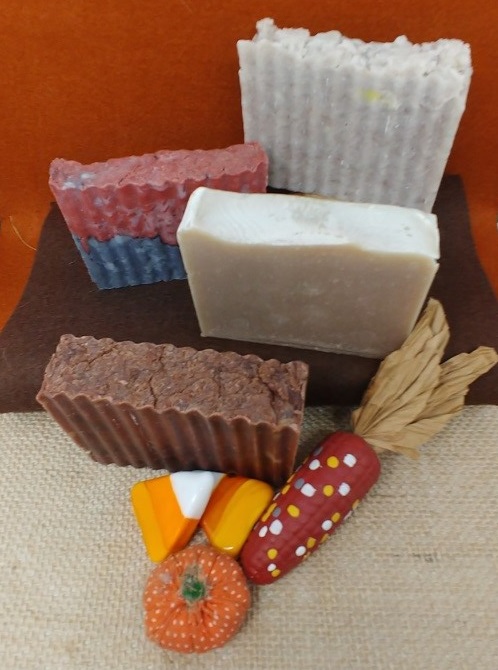A frequent question I am asked at craft shows is, “How long will this soap last compared to what I buy in the store”? The answer is, “it depends”. There are several factors that will affect the life of a bar of soap. This blog post will discuss the things that affect the longevity of handmade soap.
First, it is important to note that most commercially produced soap has additives that make the soap harder and longer lasting. The problem is that commercially produced soap is made with inexpensive oils, and much of the glycerin is removed because manufacturers make more profit by selling it separately. Then, less expensive moisturizers are added to the soap, and other hardening agents are added to make a hard and long lasting bar of soap. The soap will be long lasting and will most likely dry out your skin.
Enter handmade soap. What makes it different is the lack of unnecessary additives or chemicals. The independent soaper can add oils like Evening primrose, Rosehip, Jojoba, Shea, and other oils that that provide anti-inflammatory, anti-aging, antioxidant, and skin firming properties, but are not as cost effective. They are, however, much better for your skin and will not remove moisture. And, handmade soap has naturally occurring glycerin, which draws moisture into your skin.
But, I digress. Most handmade recipes produce a hard bar of soap that should be long lasting, and compete with commercial soaps. However, there are several things the soaper and you can do to make the soap last even longer. Here is what you should know:
- The more liquid oils the soap contains, the softer the bar. Most soaps contain a mixture of solid and liquid oils. Solid oils and butters like Coconut oil, Palm oil, Animal fat, Cocoa butter or Kokum butter help to make a hard bar of soap. A higher volume of liquid oils like Olive, Sunflower, or Canola typically make a softer bar of soap. The exception to this rule is Castile soap, which is made almost entirely of Olive oil, and is a very hard bar of soap. A hard bar of soap should contain slightly more solid oils than liquid oils.
- Use of sodium lactate in soap making will produce a harder bar of soap that releases more quickly from the mold. Sodium lactate is a liquid salt that can be added to cooled lye water in order to speed up unmolding Using sodium lactate produces harder, longer-lasting bars of cold process soap. Derived from the natural fermentation of sugars found in corn and beets, sodium lactate is the sodium salt of lactic acid. An added benefit of sodium lactate is that it moisturizes the skin by helping to draw moisture into the skin.
- Use of a loofah or mesh scrubby sponge when showering will help the soap last longer. While some soaps, like salt soap or soaps that contain exfoliating additives, are most effective when used directly on the skin, most soap will last longer when used with a scrunchy. You use less soap to get the same amount of lather.
- Using a soap dish or rest that allows the soap to dry out between uses will help soap to last longer. Soap that stays wet or sits in moisture will break down, soften and have a shorter life. Keeping the soap dry when not in use will improve its life.
- And, of course, the more frequently the soap is used, the shorter life it will have. This is true of any soap – the more you use it, the more quickly it is gone.
- Longer cure time improves soap life. Newly made soap should sit for 4-6 weeks to cure and dry. This creates a harder bar of soap that has less water volume. Even hot process soap, which technically can be used immediately without a long cure time benefits from drying for 1-2 weeks before use. This allows it to harden ever further.
So, to get the most life from handmade soap, purchase soap that is hard and contains both solid and liquid oils (oils should be listed on the label), use a scrunchy when you shower, and keep the soap dry between uses. Your handmade soap should then last at least as long, and possibly longer, than most commercial soaps, and your skin will be much happier!


